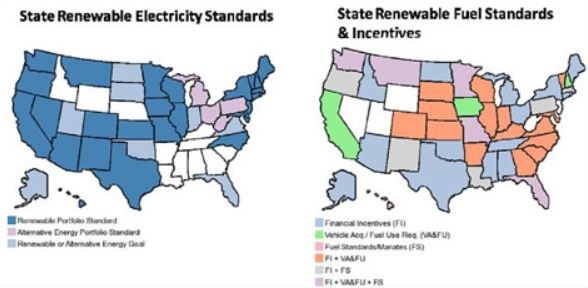New Massachusetts Report Identifies Renewable Thermal Opportunities
For many types of renewable technologies and fuels, producing thermal energy is much more efficient than producing electricity. Yet the vast majority of state Renewable Portfolio Standards address renewable thermal technologies minimally, if at all.
Why? Perhaps because it’s not easy to incorporate thermal fuel displacement into the typical RPS, which is designed to promote renewable electricity generation, and is funded through electric ratepayer charges. How do you calculate the value, in kilowatt-hours, of a solar thermal system that displaces fuel oil? And how do you justify subsidizing such a system with electric ratepayer funds? Furthermore, how can states effectively address energy systems that operate primarily at the building level?
Enter the Meister Consultants Group, author of a new report on renewable thermal energy opportunities and impacts. The report, commissioned by the Massachusetts Department of Energy Resources and the Massachusetts Clean Energy Center, addresses four renewable heating and cooling technologies: solar thermal, biomass thermal (wood combustion), advanced biodiesel, and high efficiency heat pumps (both ground source and air source varieties). The report examines how these technologies might be employed to displace fossil fuels in Massachusetts, the barriers to adopting these technologies, and how the state could promote the development and deployment of these technologies. Most importantly, the report discusses how renewable thermal technologies have been successfully supported by a few states and several EU countries — both within the traditional RPS structure, and outside of it.
An effective policy approach would address significant existing barriers to the development and deployment of renewable heating and cooling technologies, including these barriers identified by the Meister Group report:
- High upfront capital costs
- Poor public awareness of renewable heating and cooling benefits
- Opaque regulatory standards
- Poor inter-industry coordination
Such policies are unlikely to be forthcoming from the federal government in the near future. Thus far, federal renewable thermal policy has been limited to investment tax credits for solar water heating and geothermal heat pumps, and a small energy efficiency tax credit for biomass pellet stoves (but not boilers or furnaces).
The only renewable thermal fuel that has received significant federal support is biodiesel, which is supported through the Renewable Fuels Standard and the biodiesel tax credit – but biodiesel is largely used as a transportation fuel, and there are significant barriers to be overcome before it would see widespread use as a heating fuel. The battle being fought at the federal level now centers around the proposed extension of the production tax credit, which supports utility-scale renewable electricity production.
Since we cannot expect much in the way of new renewable thermal energy policies at the federal level at this time, we must look to the states. As shown in the graphic below depicting State Renewable Electricity and Fuel Standards (Source: Pew Center on Global Climate Change, 2011), most U.S. states support renewable electricity and renewable transportation fuels; but few support renewable thermal energy in any comprehensive way. This represents a significant missed opportunity.

As often happens, a number of states are ahead of the federal government on this issue, but there is room for improvement. Some states, such as California and Connecticut, offer technology-specific rebate programs for renewable thermal equipment. At least 13 states (Maryland, Vermont, New Hampshire, Pennsylvania, New York, Indiana, Wisconsin, North Carolina, Texas, Colorado, Hawaii, Nevada, and Arizona) allow solar hot water to compete under their RPS, and Wisconsin and Arizona allow biomass heating as well. However, in all states but Arizona, renewable heating technologies are only credited for displaced electricity, not for displaced fossil fuels.
It is critical that states more comprehensively address renewable thermal technologies. Thermal energy represents approximately one-third of all energy consumed in this country, and is a major source of pollution and greenhouse gas emissions.
Yet, as the Meister Group report points out, markets for low carbon, renewable energy technologies that could serve hot water, space heating and space cooling needs have been slow to develop in this country, in part because there has not been an integrated suite of policies supporting such markets. According to the report, if such policies were put in place now, by 2020 some 5,900 new jobs could be created, and greenhouse gas emissions could be reduced by more than two million tons in Massachusetts and the greater New England region alone.
In a future blog post, I’ll examine the energy- and emissions-saving potential of some specific renewable thermal technologies.
Published On
June 11, 2012

